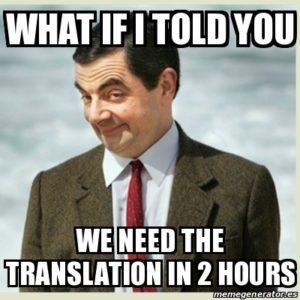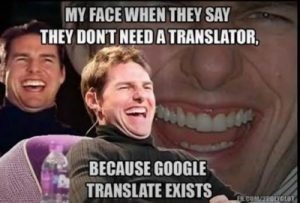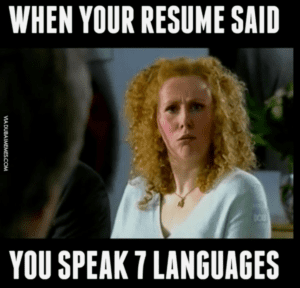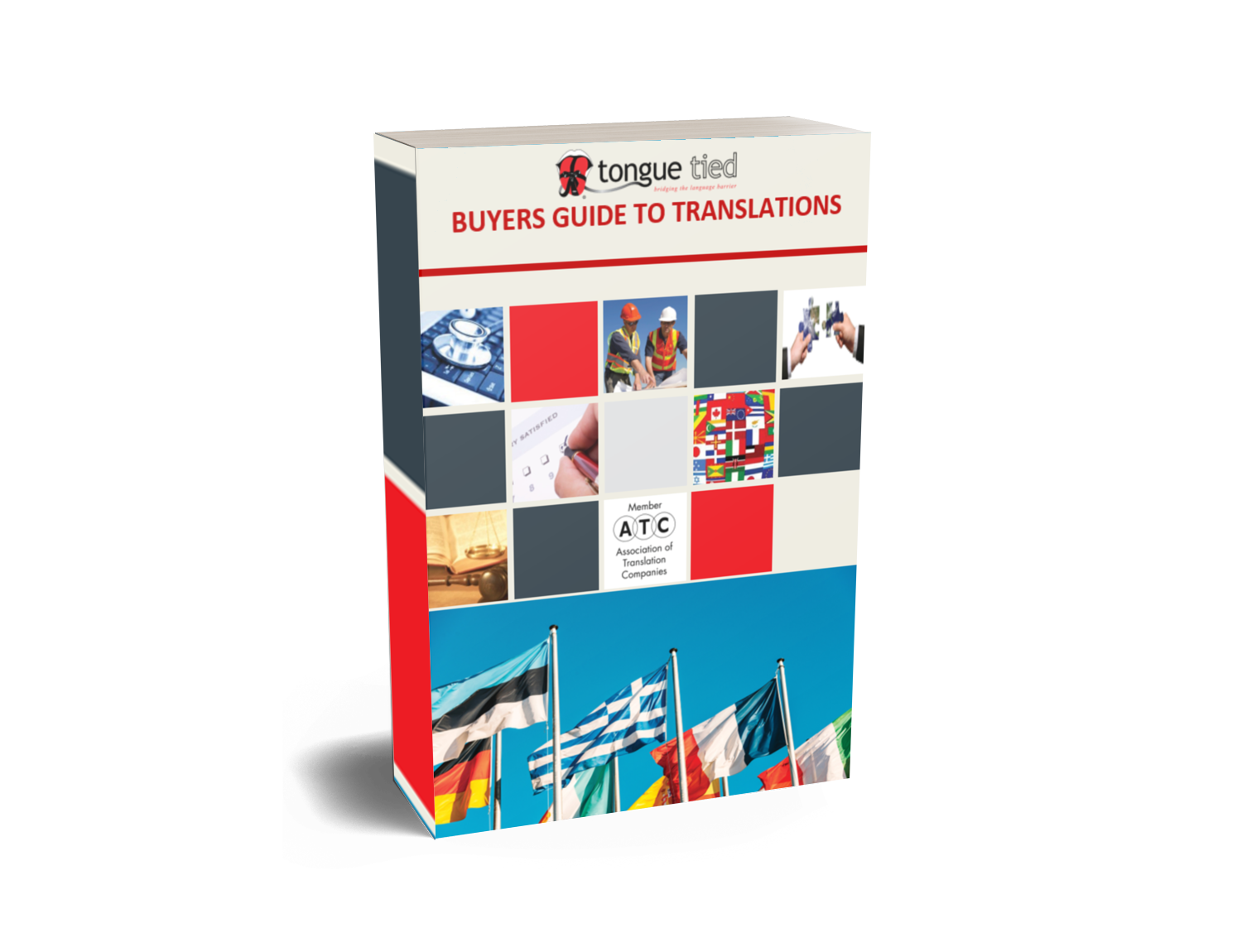Misconceptions about Translation
It’s Time to Set the Record Straight
There are plenty of myths out there about translation, both about the skill itself and the industry as a profession…
We thought we’d do some serious myth-busting and set the record straight on some of the most common misconceptions about translation…

1. If you know another language, you can be a translator
So you know more than one language? Great!
Newsflash: This doesn’t automatically make you a good translator…
Of course you need to know more than one language to be able to translate, but there’s A LOT more to it than that!
Most professional translators have a degree in a related subject area as well as a postgraduate qualification specifically in translation…
Must-have skills for professional translators include: accuracy, attention to detail, outstanding command of the source and target language, creativity, persistence - just to name a few!
And this leads us on to our next misconception…
2. Translation is just changing each word in a text from one language to another

Sorry to break it to you but again, there’s a WHOLE LOT MORE to it than that…
If you tried to translate a text word for word, you would end up with a page of complete nonsense…
Most words have more than one meaning in the source language as well as more than one translation in the target language…
And what about things like imagery, idioms and metaphors?
Translating the German saying ‘ich verstehe nur Bahnhof’ into English word for word gives us ‘I only understand train station’ – erm??? (The English equivalent of this idiom would be ‘it’s all Greek to me’…)
It’s crucial for the translator to get a thorough understanding of the source text for them to be able to translate it… and taking us back to point number one – this means they have to have an impeccable understanding of both the source and target language!
Then there’s the style and tone of the writing to think about – is the source text direct? Would that work in the target language? What does the client want?
3. It’s easy
I challenge you to say these three words to a translator:
Translation
Is
Easy
I’m pretty sure I know the kind of reaction you’d get… and it might involve some words that we shouldn’t really be using on LinkedIn!!
Any translator will tell you that they can sometimes spend HOURS struggling over one sentence in a translation, trying over and over to find the right word or phrase for a very specific context…
Several cups of coffee and plenty of hair-tearing-out later, they might still not be happy with the solution they’ve come up with…
Which leads us on to our next point…
4. Translation can be done quickly

Contrary to what some people believe and what some companies will promise you, this is not the case…
Of course there are some texts that are simpler to translate than others, but each genre requires research, knowledge and understanding…
Take a marketing slogan, for example, this could be just one short sentence or phrase, but it might take a translator a long time to come up with something that works just as well in the target language…
And if you’re wondering how bad a rushed translation can really be…
Look no further than KFC’s marketing fail in China…
They translated ‘finger lickin’ good’ as ‘eat your fingers off’!! For some reason, the Chinese weren’t rushing to buy fried chicken with that particular slogan…
A good translation company will always tell you what can realistically be achieved within a given time frame…
We believe in honesty as well as getting a job done to the highest standard!!
5. Google Translate can do the job just as well

This HAS to be one of our favourites…
As things currently stand, Google Translate still has a long way to go for it to put human translators out of business…
Not only can Google Translate FAILS be misleading for potential clients and customers, they can also be incredibly embarrassing for businesses…
In 2015, a small town in Spain was really looking forward to its culinary festival celebrating its home-grown leafy-green veg ‘grelo’…
When a rather different sort of crowd started showing up to events, the organisers realised that the Galician word ‘grelo’ had been Google-translated as ‘clitoris’ in Castilian Spanish… Needless to say those heading for the ‘clitoris festival’ were bitterly disappointed…
Just look up ‘Google Translate fails’ online and you’ll see plenty of other cringey examples of Google Translate gone seriously wrong!!
6. As long as you know the basics of the source language, you’ll be fine

Lots of people might think that because they did a bit of French at school, they could easily translate French into their native language…
Sadly, or maybe not so sadly for the professional translators out there, this isn’t true…
Not only do translators have to have an outstanding grasp of the source language that they’re translating out of, they also have to have a thorough understanding of the cultures they work with…
This comes with spending time in the country where the source language is spoken and really being immersed in the language and culture…
And no, we’re not just talking about a two week holiday sunning yourself in the south of France!
“Translation is not a matter of words only; it is a matter of making intelligible a whole culture”
7. We don’t need translation because everyone can speak English now
Thankfully this is not the case!

Whilst it’s true that English is widely spoken as a second language, this doesn’t mean that people don’t want or need to see content written in their native language…
Only about 20% of the world population (1.5 billion people) speak English and only around 360 million of those are native speakers of the language!
That leaves A LOT OF PEOPLE who either don’t speak English as their native language or speak the language at all!
It goes without saying that translating content into a target audience’s native language is more likely to resonate with them and have the impact that you want!
I hope this article has helped to clear up a few of the most common misconceptions about translation!!
Have we forgotten anything?
Do you disagree with any of the above?
I’d love to hear your thoughts in the comments below!


Hi Richard,
What a brilliant article! I totally get all of the above. Especially frustrating is the part that the British seem to think that they don’t need to learn a lanaguage. I am so pleased I have taught my daughter German from a young age. Language is a powerful tool, especially when you are negotiating. Well done for highlighting all the above.
Hi Richard,
Very good article, you are so right!
Thank you for these thoughts
Jutta
Hi Richard
Great article. Although I know enough to get by in several European languages, no way would I ever consider myself a translator, even after 46 years of writing. What you are saying, I have been saying for years. Unfortunately, many companies still don’t get it. Particularly so in Italy.
Hi Richard,
I could not agree more with you. I was born in France and lived there until I was 23. I have lived in the UK now for 27 years so I can honestly say that I have a very good understanding of both languages but I am not trained in translation. Inevitably, I have been asked by employers to do some translating for them and I am acutely aware of my lack of skills regardless of my understanding of both languages. Like any profession, there is specialisms. No-one can claim to have mastered one language entirely with all the technical vocabulary it contains, never 2 languages. Besides, languages evolve with new words added every day. So that’s “my 2 cents on the topic” and that’s not British English that’s American English 😉
Hello Richard,
Thanks for sharing true facts about the translation.
Regards,
Dinesh Kumar
Spanish
Hi Richard,
Every translator will wholeheartedly subscribe to every word of your article. Alas, very few laymen/clients will, I guess.
My mother-in-law, a professional journalist, used to think that one ONLY needs an excellent command of both his/her native language and a foreign one to successfully translate from/into them.
Many years ago she asked me to translate an English text into Russian for her. I had managed to make about two thirds of the translation by the time I realized I needed to catch up on the backlog of my own translation jobs with tight deadlines. So, she had to ask our friend, a teacher of English and writer (and a native speaker of Russian), to finish the translation. After comparing the two parts, my mother-in-law admitted, “Now I understand, Andrei, that translating requires training and talent…”
Thank you for your article!